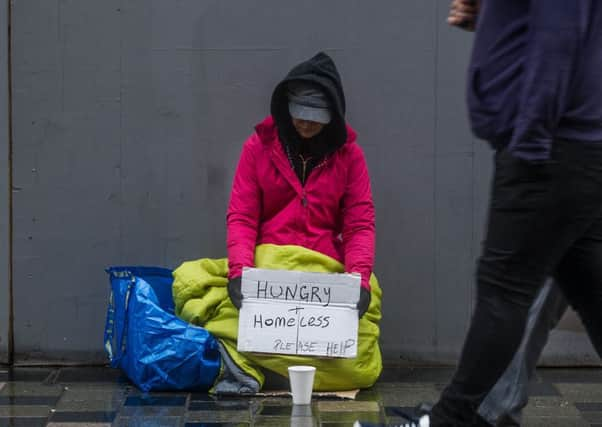Scotland's homelessness crisis looming as deaths mount


It follows growing anger after rough sleeping deaths in Glasgow prompted calls for empty buildings to be opened to shelter for the homeless.
The number of rough sleepers is expected to nearly double from 800 to 1,500 over the next 25 years, according to research from Heriot Watt university. Rates of people sofa-surfing due to lack of a permanent home are set to rise by almost a quarter (23 per cent) in the next ten years.
Advertisement
Hide AdAdvertisement
Hide AdJon Sparkes, chief executive of Crisis, said: “Unless we take action as a society, the problem is only going to get worse with every year that passes.
“That means more people sleeping on our streets, in doorways or bus shelters, on the sofas of friends or family, or getting by in hostels and B&Bs. In order to tackle this, it’s crucial we first understand the scale of the problem.”
There are currently 11,800 people across Scotland either sleeping rough, staying in hostels, living in unsuitable temporary accommodation, sofa-surfing, sleeping in cars, or staying in squats or refuges. The analysis commissioned by Crisis indicates this will rise to 12,200 by 2021 before accelerating to 18,100 – up 53 per cent on current levels – in 2041.
The death of a rough sleeper in Glasgow’s Trongate in March led to calls from campaigners to open up all available empty buildings in the city centre to prevent any future deaths.
One homeless person dies every week on average in Scotland’s biggest city, according to figures released by the council.
The report today estimates that at any one time in 2016, across Scotland 800 people spent one night sleeping rough, 5,200 households were sofa-surfing and 2,100 households were living in unsuitable temporary accommodation.
A further 2,300 households were staying in hostels while 1,400 households were living in other circumstances, including squats, women’s refuges, winter night shelters, sleeping in tents, cars or public transport.
In response to the report’s findings, Crisis is calling on the public to join its Everybody In campaign aimed at ending the worst forms of homelessness.
Advertisement
Hide AdAdvertisement
Hide AdHousing minister Kevin Stewart said: “We have some of the strongest rights for homeless people in the world, which has already led to falling homelessness in Scotland in recent years, despite challenges such as the UK government’s welfare cuts and benefit cap.
“However, we agree with Crisis that there is more to do.”